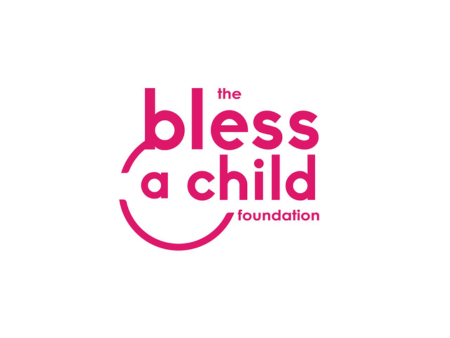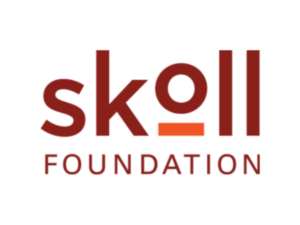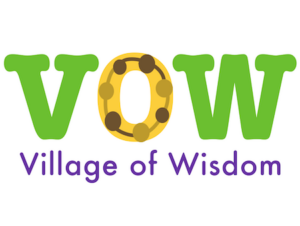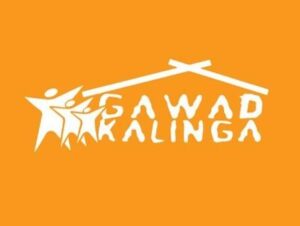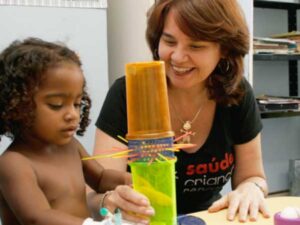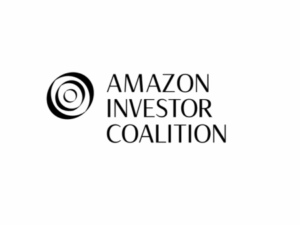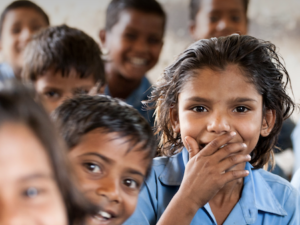Bless a Child Foundation supports children with cancer and their caregivers in Uganda. Services include accommodation, meals, transportation, counseling and support groups, and homeschooling.
Brian Walusimbi of Bless a Child Foundation spoke with Catherine Edwards on April 14, 2023. Click here to read the full conversation with insights highlighted.
Catherine Edwards: To begin with, could you please introduce yourself, your role at your organization, and also describe the problem that your work is addressing?
Brian Walusimbi: My name is Brian Walusimbi, and I always like to introduce myself as a clown. I am from Uganda, East Africa, and from Bless A Child Foundation. We take care of children suffering from cancer in Uganda by providing accommodation, meals, psychosocial support, and access to cancer care and treatment.
Catherine Edwards: Could you describe a bit more about how you do that work, how you link up with the children and what the different stages are to the help that you offer them?
Brian Walusimbi: Every year, we see close to 500 new childhood cancer patients that come through our doors. We provide accommodations, because a lot of families do not have a place to stay while they come to the city center for their treatment. Only 20% of the children can access treatment, and only 20% can actually be able to start and finish treatment.
One of the ways we are trying to increase the survival rate and also access to treatment is by providing accommodation, psychosocial support near or around the treatment center so that families can not be worried about where to sleep, what to eat, but have a place that’s comfortable. They can focus on taking care of their children as they’re going through treatment.
Catherine Edwards: What is it about your work that is different from other initiatives that are addressing the same problem?
Brian Walusimbi: One of the things that we have noticed that is different is that there are very few people that are doing our work in Africa. So it’s a huge need. Right now, we are working with WHO to raise the cancer survival rate from 20% to 60% by 2030. There are so many children that are dying of cancer and there are two main causes of death, apart from access to treatment. It’s toxicity from medication and abandonment of medication. Abandonment of medication is that the families cannot afford the expenses around treatment. We open up something like Ronald McDonald Houses in Uganda where a family can come and stay together and be able to get closer to their treatment and fight for their children’s lives.
Catherine Edwards: How are you measuring the success of your work? What measurements are you using?.
Brian Walusimbi: We opened up the very first home in March of 2010. Since then, we have taken care of over 7,000 children. The need is huge. Recently, we wrote this in the Guardian newspaper, one of the hospitals where we opened up a home only had 10% of children start and finish the treatment. 90% would fall out. When we opened up our homes, last year they had 96% of the children be able to start and finish treatment. That shows the power of having the psychosocial support around a hospital and the difference it is making.
Catherine Edwards: Can you share an example, perhaps, of one of the families that you’ve worked with, or an example that shows the impact that this can have?
Brian Walusimbi: I have an amazing story of a young lady called Kathy. When I picked up Kathy from the hospital, the hospital had given up because she had a very unique cancer called chordoma. The only thing that was upholding her spinal cord was a massive tumor. That very night that Kathy came to stay with us, I thought that Kathy was going to pass away, but she stayed with us for a few years. We provided care. We provided support. We provided all the help we could because she could hardly even turn. She could only sleep on her stomach.
One day a surgeon came in from Texas Children’s Hospital and said he could try to take this tumor out. We looked for the money, and we got Kathy to Texas Children’s Hospital. The massive tumor was taken out. Kathy ended up losing both legs because they had to try and find a way, use her bones to uphold her spinal cord, but Kathy’s back in Uganda alive, and doing really well. She even started up her own business, and she’s very healthy. What could have never happened, every doctor had said, every surgeon in and around Africa said it was impossible to take the tumor out, but that tumor was taken out and she is alive.
Kathy is just one of the endless stories that we get to see on a daily basis. The children that come through our doors are at the last brink of their lives and they are finding hope and staying alive. What we do is we keep hope alive.
Catherine Edwards: How do you build those connections with these international doctors or the people that can try the more difficult surgeries?
Brian Walusimbi: It’s interesting. It’s through conferences like these, like Skoll, that we get an opportunity to connect and network with amazing people. It’s the power of synergy and the power of connection that, as we keep on sharing what we do, we are linked up to so many other people. When you talk about your needs, there is somebody who has a solution. I’ve had opportunities to move to a number of places and talk to a lot of people. We have gotten support and encouragement, and also a lot of no’s as well. It’s part of the journey, but the support that we have received has opened up so many doors for us to be able to do what we are doing.
Catherine Edwards: You said there’s not too many people that are working in this field, but I’m wondering what you would say, if there were other people trying to get started, what are the insights or lessons you have learned that you could share with them?
Brian Walusimbi: Working with children suffering from cancer is not easy. It is tough. It is painful at some moments, but it’s also rewarding. There’s so many moments of joy, moments of happiness that you get to experience. One of the things that I’ve noticed is that, at the end of the day, despite the tumors, despite the cancer, they are just children. They want to be alive. When they have a little bit of energy, they are out playing, being mischievous, breaking things.
There is so much hope that you can give. Every family deserves a chance to have their child alive. Every child deserves a chance to grow up and become the next president, a doctor, a lawyer, or even a bus driver. It’s easy to say that we’ll focus on and invest in research. It’s so easy to say that we’ll only invest in medicine and access to treatment, but I think we also need to invest in psychosocial support for the families. I would love as many people to come and join in the fight against childhood cancer.
I want to share a statistic. In high-income countries, the survival rate is at 80%. 80% of the children that have cancer get a chance to live. In low- and middle-income countries, that number is only 20%. We are working with WHO to see that number rise to 60% by 2030. The only way we can do that is if we can all come together. Every step, every voice, every action, every donation counts in order for us to do this.
Catherine Edwards: What are the challenges and the obstacles that you’re facing as you’re trying to reach these goals and make that change?
Brian Walusimbi: There are a lot of obstacles. One is access to treatment. The treatments that are available in many of our countries, in the low- and middle-income countries, are really cheap and ineffective treatments. We need access to treatment, and we need awareness. A lot of our families get to the treatment centers when it’s too late, when the cancers are in stage three and stage four, because they didn’t know. We need to think about ways to diagnose cancer much faster because a lot of people end up going to hospitals or little clinics, and nobody has any idea what it is, so a lot of time is wasted.
We also need to bring into this conversation traditional healers. We need to bring in faith-based organizations because a lot of people end up going to faith-based organizations or to traditional healers for solutions. They need to be able to direct the people where to go. With information, with awareness, I believe that we will be able to lower cancer rates and we’ll be able to up the survival rates.
Catherine Edwards: What are some of the strategies that you’ve tried to deal with those challenges? Is there anything relating to one of those challenges that you found is a really effective way of overcoming it?
Brian Walusimbi: One of the things that we are doing is providing access to psychosocial support so that the family can come and stay. It’s usually that a lot of families come in, and they run. They disappear, or they abandon treatment because it’s way too expensive. We are working towards bringing that support for the families to be able to stay close to the hospital, and start and finish the treatment.
We are also working with WHO and with St. Jude Hospital to provide access to treatment. St. Jude Hospital recently donated over $200 million towards access to treatment. That money is going to go to low- and middle-income countries. We are also pushing with the International Atomic Energy and WHO to see that we can have pediatric radiologists trained, and that we can have good machines available for radiology. We are, where I am in Uganda, opening up the first pediatric end-of-life care, palliative care center, where the families that are beyond treatment can have a place to stay during their last days, and a place where we can manage the pain effectively.
Those are some of the things that we’re doing, but we’re also trying to raise awareness as much as possible, train doctors, train nurses through St. Jude Hospital, through WHO openings, through Texas Children’s Hospital and Baylor College opening up opportunities for people, for doctors, for nurses to be trained.
Catherine Edwards: Going back to the psychosocial support, you’ve mentioned the accommodations so that families can stay nearby. Are there other elements to that support?
Brian Walusimbi: Food is provided and transportation back and forth from the villages because cancer treatment is over a long period of time, and it usually has breaks in between. The food and the transport being provided makes a big difference. There is also sibling support where we help the children that are staying home without one of the parents, either a mother away or a father away for a long period of time, so they can get a chance to go back to school and continue on with their lives as their brother or their sister is going through cancer treatment.
We also provide education. We have a school in every single home where the children can continue with their education. We have had some of the kids actually come out and be the best in the country in their school examinations. We also support the mothers with a small grant and skill development training so that they can go back to their villages, after the treatment is done, to be able to open up a business and start living a life again. Some of them go back with a healthy child, but some don’t. Some go back with a casket, and it’s really hard for them to integrate back into life, so we provide that support.
Catherine Edwards: It sounds like you’re working on a lot of system-level change, with the World Health Organization and others. Could you talk a bit more about how you’re doing that?
Brian Walusimbi: I am one of the consultants for WHO. We have a program called the GICC, the Global Childhood Cancer Initiative. WHO is working with so many organizations that are involved in pediatric cancer, and we are working towards raising childhood cancer survival rates from 20% to 80%. It’s a group of dedicated hospitals, dedicated doctors, nurses, specialists, all coming together as one to see that we make this dream possible.
We get a lot of support from St. Jude Research Hospital that donates towards the access of treatment, but we believe that we can do more. WHO is helping to set the policies so that it’s not only the hospitals doing that, but it’s the governments doing that. WHO is getting the ministries of health in the government to put a cancer control plan to include pediatric oncology and pediatric cancer treatment and support. That is what we’re doing. In Africa, we are starting with Zambia. That’s going to be the first country rolling it out, and there’s many other countries that have been lined up. We’re looking forward to getting that started this year. to see that the treatment gets to the countries and the supply chain of treatment is available.
Catherine Edwards: What are your other plans for the next five years? What will you be working on next to keep this growing?
Brian Walusimbi: I’m looking forward to expanding our reach to all of East Africa, Kenya, Tanzania, Rwanda, opening up homes near the hospitals so that kids can continue to access the treatment they need. We are also opening up palliative care centers. That’s our new dream to also get access to that other side of support for the families that are way beyond treatment to at least live a pain-free life. That’s going to be our drive for the next five years. Also, looking for networks to connect with more funders, more like-minded people and people that are passionate about the work that we do.
Catherine Edwards: You mentioned earlier that the families need to be more aware and individuals need to be more aware so the children can get the treatment sooner. How are you raising awareness in the communities?
Brian Walusimbi: We are working with organizations to raise awareness as much as possible. We are doing radio programs to talk about childhood cancer. But we also have another challenge because we can talk about childhood cancer, and people can flood the treatment centers, but if the treatment centers are not equipped and trained well enough to diagnose, then we have a problem.
One of the other things we need to do, and I think this needs to be done as quickly as possible, is we need more doctors trained. Some of these hospitals don’t have pediatric oncologists, especially the hospitals in the villages. In most countries, you find that it’s only one specialized hospital that’s doing childhood cancer treatment. We need to be able to get that information into the hands of the general doctors and the general nurses, train them on early warning signs, what to look out for, provide referral numbers or connections of where to send a patient to if you notice that there is something that you can understand that’s pretty off. We need to get these referrals way faster and quicker.
Catherine Edwards: How are you reaching the doctors and nurses to get them that information?
Brian Walusimbi: The doctors and nurses, we are still trying to figure out that missing piece of the chain. We haven’t yet figured it out. Also, there is not that much information around early warning signs of pediatric cancer because the cancers are so different, and they can appear in different ways as well. We are talking to WHO that we need to figure out a quicker way to diagnose. We need to know which ones are the real early warning signs because some symptoms can be signs for anything, a headache, swelling. Those can be anything, so we need to try and figure out what are some of the quickest ways to diagnose.
Catherine Edwards: Is there anything else that we didn’t cover that you think is important to add?
Brian Walusimbi: We need more people to invest beyond research because right now, at the moment, a lot of people are investing in research, but there is more to pediatric cancer treatment than research. We need more investors to invest in all the other areas.
Another thing that I can say is that a lot of people do not have any idea that there is cancer in Africa, and that cancer is growing and pediatric cancer is growing in Africa. Many of us, when we think about Africa, we think about HIV/AIDS, we think about malaria, but cancer is ravishing and taking so many lives in Africa. I think cancer should also be put among the needs, the areas that the world needs to focus on and needs to invest in when they’re looking at Africa as well.
Catherine Edwards: Thank you so much for talking with me about the important work that you’re doing. I think it’s going to give people a lot of insights.
Click here to read the full conversation with insights highlighted.
Catherine Edwards is a journalist and content strategist based in the UK, having also lived and worked in Germany, Italy, Sweden and Austria. She supports newsrooms and mission-driven organisations with content strategy, audience development and constructive journalism.
* This interview has been edited and condensed.
Learn about other social change organizations working in Uganda.

